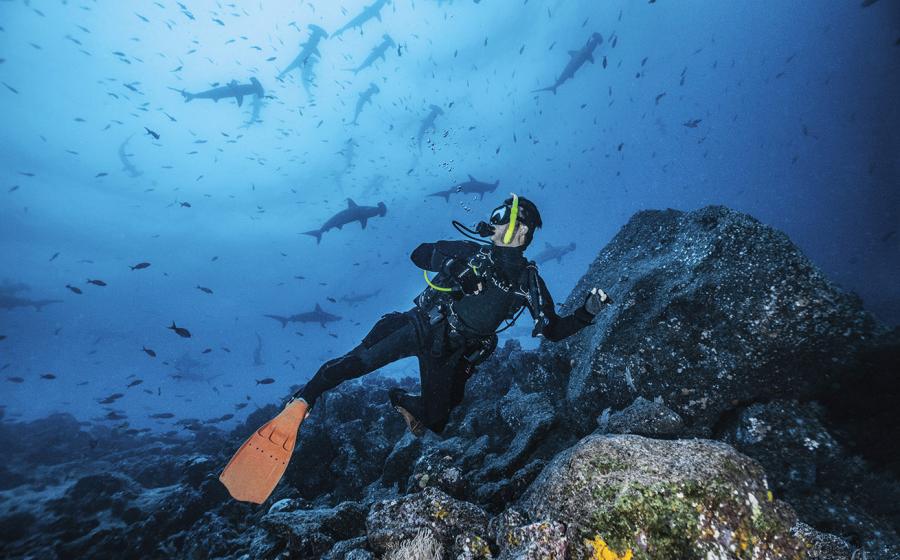Learn to Dive

So you want to learn how to scuba dive, eh? Well, you've come to the right web site. ScubaDiving.com is the online home of Scuba Diving, the magazine divers trust for honest travel articles, objective gear reviews and critical training techniques. To make your experience painless and hassle-free, follow these steps for becoming a diver now:
1. Dispel the Myths About Diving
We're sure you've heard it all before -- you'll run out of air, you'll be eaten by a shark, it's a macho sport. And we call BS on each one of them. Chances are, these crazy notions have kept you from learning how to dive. We present the 10 most common myths about scuba diving, and systematically destroy each one. Don't let these misconceptions hold you back. Visit www.scubadiving.com/article/10_Myths_About_Diving to learn more.
2. Get Started
Learning to dive involves three phases: academic study that includes the physics and physiology of diving; confined-water training (often called pool training) to learn and practice basic skills; and open-water checkout dives to prove mastery of basic dive skills. To better understand this process, read "Getting Started" here: www.scubadiving.com/article/Getting_Started.
3. Find a Good Dive Shop Near You
Unfortunately, you can't teach yourself how to dive. To find a dive store near you for either traditional dive courses or to explore home-study and resort referral options, visit one of Scuba Diving magazine's Golden Tank dive centers. For a complete list, visit www.scubadiving.com/training/findaninstructor.
4. Buy Some Gear
To learn to dive, you'll at the very least need at least a mask, fins and snorkel. The other stuff, including a buoyancy compensator, regulator, wetsuit, etc., can come later on when you've got a better idea of what you'll need. Here's our beginner's guide to the equipment that makes diving possible: www.scubadiving.com/article/Dive_Gear_101.
5. Pick a Destination, Any Destination
You've got your C-card, your dive gear, and an itch to use it all. Your bathtub is close and cheap, but doesn't really qualify as a dive vacation. But it's a big world out there -- where do you want to go? We break down the 12 best dive destinations for beginners, to help you take the guesswork out of deciding where to go. Go to www.scubadiving.com/article/Travel_Guide_Name_Your_Adventure.
6. Talk to Other New Divers
All divers were new once. You're joining an elite group of people who enjoy exploring a seemingly hostile environment. Talking to other new divers, as well as experienced ones, will help you get through your jitters, provide you with tips and techniques for making diving safer, easier and more fun, and answer any questions you might have. Jump into a conversation with other new divers now -- visit our "New Diver" Message Board, click here: www.scubadiving.com/forum/tt.aspx?forumid=4.
7. Still Have Questions?
If our myth-busting wasn't enough for you, read our "Ask the Instructor" articles which will answer all your unanswered questions. Visit www.scubadiving.com/training/basicskills/ to learn more.

So you want to learn how to scuba dive, eh? Well, you've come to the right web site. ScubaDiving.com is the online home of Scuba Diving, the magazine divers trust for honest travel articles, objective gear reviews and critical training techniques. To make your experience painless and hassle-free, follow these steps for becoming a diver now:
1. Dispel the Myths About Diving
We're sure you've heard it all before -- you'll run out of air, you'll be eaten by a shark, it's a macho sport. And we call BS on each one of them. Chances are, these crazy notions have kept you from learning how to dive. We present the 10 most common myths about scuba diving, and systematically destroy each one. Don't let these misconceptions hold you back. Visit www.scubadiving.com/article/10_Myths_About_Diving to learn more.
2. Get Started
Learning to dive involves three phases: academic study that includes the physics and physiology of diving; confined-water training (often called pool training) to learn and practice basic skills; and open-water checkout dives to prove mastery of basic dive skills. To better understand this process, read "Getting Started" here: www.scubadiving.com/article/Getting_Started.
3. Find a Good Dive Shop Near You
Unfortunately, you can't teach yourself how to dive. To find a dive store near you for either traditional dive courses or to explore home-study and resort referral options, visit one of Scuba Diving magazine's Golden Tank dive centers. For a complete list, visit www.scubadiving.com/training/findaninstructor.
4. Buy Some Gear
To learn to dive, you'll at the very least need at least a mask, fins and snorkel. The other stuff, including a buoyancy compensator, regulator, wetsuit, etc., can come later on when you've got a better idea of what you'll need. Here's our beginner's guide to the equipment that makes diving possible: www.scubadiving.com/article/Dive_Gear_101.
5. Pick a Destination, Any Destination
You've got your C-card, your dive gear, and an itch to use it all. Your bathtub is close and cheap, but doesn't really qualify as a dive vacation. But it's a big world out there -- where do you want to go? We break down the 12 best dive destinations for beginners, to help you take the guesswork out of deciding where to go. Go to www.scubadiving.com/article/Travel_Guide_Name_Your_Adventure.
6. Talk to Other New Divers
All divers were new once. You're joining an elite group of people who enjoy exploring a seemingly hostile environment. Talking to other new divers, as well as experienced ones, will help you get through your jitters, provide you with tips and techniques for making diving safer, easier and more fun, and answer any questions you might have. Jump into a conversation with other new divers now -- visit our "New Diver" Message Board, click here: www.scubadiving.com/forum/tt.aspx?forumid=4.
7. Still Have Questions?
If our myth-busting wasn't enough for you, read our "Ask the Instructor" articles which will answer all your unanswered questions. Visit www.scubadiving.com/training/basicskills/ to learn more.






